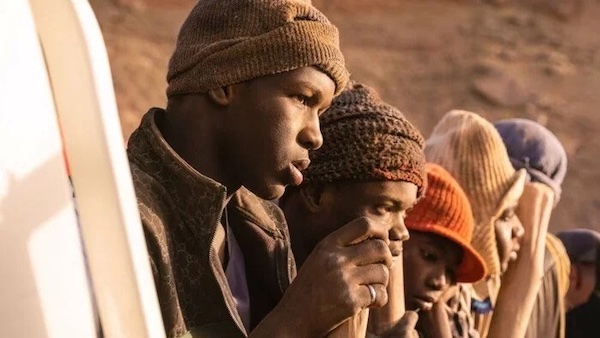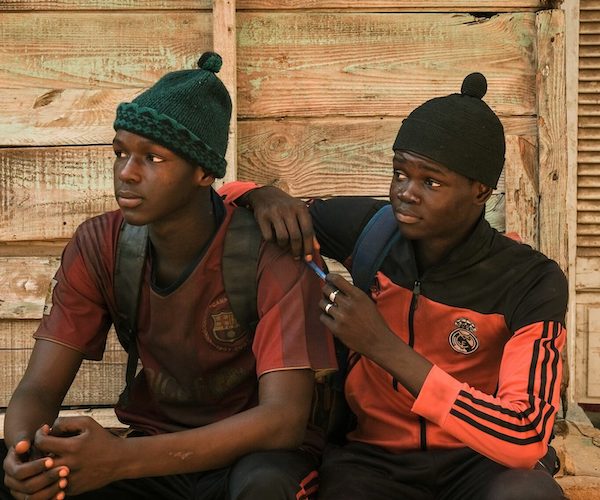Film Review: “Io Capitano” — When You Wish Upon a Star?
By Peter Keough
The plight of refugees is given a fairy-tale treatment in Io Capitano.
Io Capitano. Directed by Matteo Garrone. Screening at the Kendall Square Cinema beginning February 23.

(L to R) Seydou Sarr and Moustapha Fall in Io Capitano.
A filmmaker with an eye for the grimly and grotesquely realistic, Matteo Garrone also has a thing for fairy tales (though as Bruno Bettelheim in The Uses of Enchantment demonstrates, the two are not necessarily mutually exclusive). Indeed, even in his most naturalistic film, the remorseless Gomorrah (2008), Garrone’s young protagonists set off on their path of doom because they have been bewitched by the modern day fairy tales of Hollywood gangster movies. And the protagonist in his satiric Reality (2012) has been bedazzled by the delusional promise of reality television — the fantasy world that would soon give us our 45th president. In his two films based on the genre, Tale of Tales (2016) and Pinocchio (2019), he backs up the make-believe with rigorously imagined, creepy details. I still shudder when I recall the giant flea and the flayed crone featured in the former.
So his fusing of the real and the fabulous in his most recent film Io Capitano (a nominee for this year’s Best International Feature Film Oscar) is nothing new. But is it appropriate? Given the fraught nature of the subject — the appalling suffering of beleaguered migrants seeking better lives — perhaps a more straightforward approach would have been in order. For that, you might check out some of the recent documentaries on the subject, especially Gianfranco Rosi’s harrowing Fire at Sea (2016). Or, for a darker, more frightening venture into the phantasmagorical, Mati Diop’s ghost story Atlantics (2019).
Like Diop’s doomed refugees, teenaged Seydou (Seydou Sarr) and Moussa (Moustapha Fall), the protagonists of Io Capitano, are from Dakar, Senegal, one of the more stable countries in Africa. They live in poverty but relative comfort. They are not fleeing any urgent, existential threats — the biggest hassle seems to be Seydou struggling to sleep while his sisters don costumes for an upcoming street festival. Instead, the pair want to fulfill their dreams of becoming pop stars (Dakar natives and screen newcomers Sarr and Fall are both successful musicians). Deluded by slick images from television and other media (oddly, Garrone doesn’t show any of these), they see Europe as a magic kingdom where wishes of upward mobility can come true. So they save up money to pay a trafficker to transport them across the continent to Libya and from there across the Mediterranean to Italy.
Seydou tries to tell his mother about their plans, but is put off by her outraged opposition. They confer with an elder who is equally furious at their folly: “Those who left are dead in the desert or in the middle of the sea!” he warns them. Undaunted, they consult a dubious shaman who instructs them to ask permission from their ancestors in the cemetery. They do so, intoning their apologies to the silent graves, and check back with the shaman a few days later. After conferring with an urn, he tells them they’re good to go.
Predictably, their trip soon runs into trouble. They shell out cash for a fake passport, but the first armed goon they encounter at a checkpoint quickly recognizes it as bogus and demands a bribe. A fellow Senegalese counsels them on the dangers of the desert and advises them to hide their money in their anus — a tactic that will later backfire. And, indeed, the desert proves their undoing, its fatality revealed first by glimpses of the desiccated corpses they pass as they lurch over the dunes in a pick-up, then by the refusal of the driver to stop for a passenger who falls off. The unfortunate person is left behind, presumably to join the countless other casualties littering the sands.
The pair’s fortunes take a more treacherous turn when their driver dumps them at a tiny oasis, where they are led the rest of the way by an ancient, indefatigable nomad. The parade of parched, exhausted stragglers lengthens as they trek across the dunes — in one scene they appear in silhouette, lining a hillside like the Dance of Death in The Seventh Seal.

(L to R) Seydou Sarr and Moustapha Fall in Io Capitano.
When an older woman falls and can’t get up, Seydou responds to her cries for help. He tries to bring her to her feet but she can’t move. Clearly she reminds him of his mother, whom he left behind in Dakar without telling her where he was going. We see the line of weary stragglers vanishing far in the distance — Seydou is at risk of being left behind. Then a miracle, of sorts, happens. Or would have if in this unforgiving world wishes came true and good intentions were enough.
Their hard luck continues as the two are separated and Seydou must press on alone despite the Libyan mafia, desert torture chambers, and pangs of guilt and loneliness. But not every encounter is with an ogre. He meets with benevolent souls who aid him and some who are just in it for the money, but who offer him an opportunity to save not himself but scores of others if only he remains true to his essential decency, courage, and optimism. The film concludes with a shot that is as triumphant and ambivalent as that at the end of The 400 Blows.
Is it a feel-good ending to a feel-bad situation? To its credit, given its outstanding performances from its amateur cast, its engaging soundtrack, and blithe, sometimes magical narrative, Io Capitano focuses valuable attention on a human tragedy that has been twisted and exploited for base and hateful political ends. But the film does not go far enough, failing to meaningfully critique the entitled powers that have exacerbated the growing misery. It’s the kind of film in which you’d expect to see an alarming postscript with facts and figures about the crisis. But there is none. And that is disappointing because in 2023 2,500 refugees died trying to make the crossing from Africa to Europe, two thirds more than did the year before. That is a tragedy that no fairy tale can mitigate.
Peter Keough writes about film and other topics and has contributed to numerous publications. He had been the film editor of the Boston Phoenix from 1989 to its demise in 2013 and has edited three books on film, most recently For Kids of All Ages: The National Society of Film Critics on Children’s Movies (Rowman & Littlefield, 2019).
Tagged: Io Capitano, Matteo Garrone, Moustapha Fall, migrant crisis, migrants
